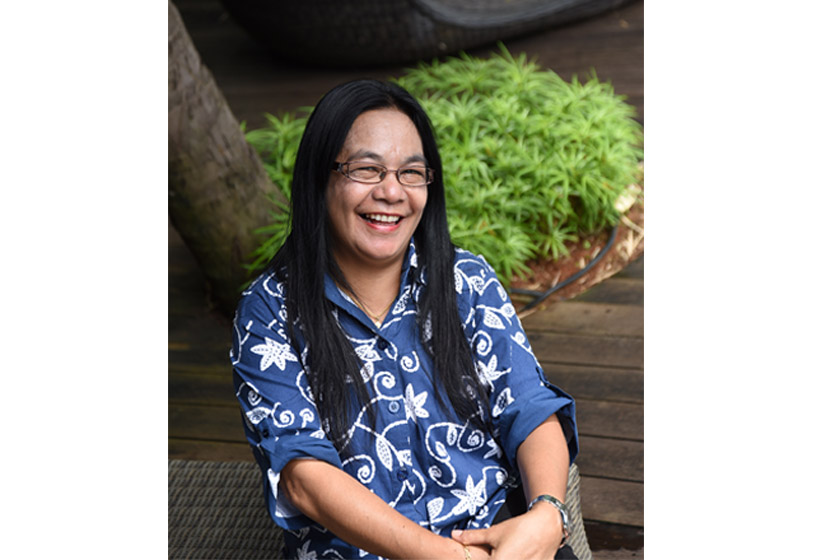Financial literacy is changing the lives of more than 100 villagers and their families across two coastal communities in East Nusa Tenggara, thanks to a program run by the East Nature Gate Foundation (Yayasan Gerbang Alam Timur, or YAGAT), and funded by the Australian Government through the Alumni Grant Scheme.
The program is teaching villagers—especially the women—to save and manage money through a savings and loans program, which in turn also provide them with capital for a more sustainable income by selling organic vegetables and through fishing.
The catalyst for the program came when Raineldis Boleng Hayon, Director of YAGAT, participated in the “Empowering Women for Sustainable Development of Indonesia’s Aquatic Living Resources” course at Monash University under the Australia Awards Fellowship.
Since 2002, YAGAT had run similar financial literacy and sustainable organic farming programs for inland villages, but it was during her Australian studies in 2016 that Raineldis realised the coastal communities would benefit tremendously from such programs as well.
“To supplement their families’ income, the women in these coastal communities mine sand. It’s back breaking work and takes them two weeks to fill a truck before being able to sell it for a paltry amount. Not only that, mining sand causes erosion of the coastlines, which affects the safety of their living conditions and livelihood as fishermen,” Raineldis explained.
To help these women and their families, YAGAT introduced the same programs they had been running, but added a sustainable fishing component with input from Dr Paul McShane, Chief Research Officer and lecturer at Monash University, and Dr Gunnar Kirchhof, Senior Research Fellow and lecturer at the University of Queensland.
Gardening and fishing aren’t new to these coastal communities, but the program introduced a more sustainable way for them to not only feed their families, but also seek additional income opportunities through selling the vegetables and fish to neighbouring villages and markets around the city of Kupang.
The biggest impact, however, came from the financial literacy initiative. Isolation and difficult coastal terrain mean these villagers don’t have easy access to the cooperatives or other financial institutions in in the city. With an unstable income due to seasonal fishing and non-optimal farming/gardening, families often turn to loan sharks.
By introducing a savings and loans initiative, YAGAT provided a way for the coastal communities to avoid incurring increasing debt to the loan sharks, and education for villagers on the importance of financial planning and saving.
Members pay a nominal monthly due and can deposit an additional voluntary amount as savings, and at the end of each month, all the collected amount are distributed out as loans at a 1% interest rate—much lower than the common 20% interest rate loan sharks charge.
Meticulous recordkeeping provides transparency, and a zero cash balance at the end of the month gives members a sense of security that no one can embezzle their savings.
“Ensuring that all the cash is distributed and none is left fosters trust amongst the members,” Raineldis said. “At the beginning of this initiative, only eight people were willing to participate, but after the other villagers saw the benefit and the transparency, more people joined.”
Currently, 128 people—69 women and 59 men—spread across four groups in two villages are reaping benefits from the initiative. Three of these groups have even been recognised by the head of the village and are given permission to access the village funds.
The benefits aren’t only financial, but also a change of mindset. Members can only request a loan amounting to twice the total of their savings, which encourages them to save.
“They are also required to submit a request for a loan one month in advance, which fosters a habit to plan ahead,” Raineldis further explained. Priorities are discussed openly amongst members, with most requesting loans for their children’s tuition, or for gardening and fishing tools.
If there is a surplus of cash after loans are distributed, the balance is put into a savings account with a credit union, the interest providing daily income for the group. Should the need arise, the group can withdraw the funds at any time.
At the end of the year, the interest from the loans and savings, if any, is paid back to the members—even children—as dividend. “The sense of pride these children have in knowing that they’ve helped contribute to their family and village economic wellbeing is tremendous,” Raineldis smiled.
What’s even more astounding is the effect this initiative has in promoting gender equality. The community is now involving the women more in decision making.
“The fact that the women now have the opportunity to show they are capable of handling finances—something that is traditionally done by men—has improved the women’s standing within the community,” Raineldis remarked.
The most exciting development for Raineldis is the potential for this initiative to be replicated across other coastal communities.
“The impact is so enormous that neighbouring coastal communities are approaching YAGAT to help them run the same initiatives.”





 Gender equality through financial literacy
Gender equality through financial literacy
